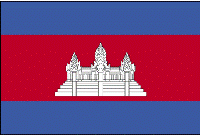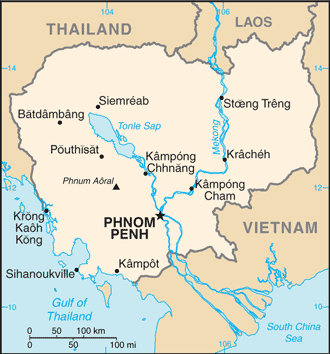Cambodia, with a total population of 14,952,665 as of July 2010, is
located in Southeastern Asia, bordering the Gulf of Thailand, between
Thailand, Vietnam, and Laos. The country mostly has a tropical climate
and covers a total area of 181,035 km2.
 |
| The national flag of Cambodia. Image Credit: CIA Factbook |
Cambodia gained its independence from France in 1953. The country’s
economy between 2004 and 2008 largely depended on the construction,
tourism, garment and agricultural sectors.
Cambodia’s economic growth rate increased by about 10% each year
between 2004 and 2008, but in 2009 the growth rate saw a decline because
of the global recession. However, the country managed to improve its
economic status in 2010 and 2011 mainly through its renewed exports and
tourism sector. The country’s GDP as of 2011 was $33.89 billion.
Overview of Resources
Cambodia’s key natural resources include gemstones, gas, oil, phosphates, manganese, iron ore and timber.
In 2010, the country’s industrial mineral sector produced an
increasing amount of crushed stone and sand and gravel. These minerals
were consumed by the country’s construction industry, and limestone was
consumed domestically for the production of cement.
Industrial Minerals
In 2010, an agreement was signed by the national company Chip Mong
Group with Siam Thailand’s City Cement Plc. to construct a cement
factory in Cambodia’s Province of Kampot. This new facility, that will
be the country’s second cement factory, was estimated to produce 1 to
1.5 Mt of cement annually. The feasibility study of this new plant
reached its final stage in 2011 and will be completed after a few
months. A period of two years has been scheduled for the construction of
this new plant.

The map of Cambodia. Image Credit: CIA Factbook
Metals
In 2010, a bauxite exploration program scheduled for two years was
started by the Vietnam National Coal and Mineral Industries Group
(Vinacomin).
In the same year, Australia’s Indochine Mining Ltd. started two
copper and gold exploration projects in Cambodia. These projects were
the Ratanakiri project in Rotanokiri and the Kratie project in Province
of Kracheh.
The Okvau gold project in Cambodia identified a gold mineralized
system within the tenement area. A number of Provinces in the eastern
part of the country was considered to be suitable for the exploration of
base metals and gold. Seven exploration licenses in these Provinces
were owned by Southern Gold in 2010.
In 2010, Vietnam’s Hoang Anh Gia Lai Group (HAGL Group) was given the
license to carry out exploration activities in one of Cambodia’s iron
ore mines.
Fossil Fuels
The offshore oilfield Block A, located off the cost of Cambodia, was
controlled by the Chevron Corp of the Unites States. Three exploration
wells were drilled by the company, which unfortunately resulted in no
proven reserves.
In 2010, JOGMEC and the Cambodian National Petroleum Authority signed
an agreement to jointly operate the country’s oil and gas sector. As
part of this agreement JOGMEC decided to discover oil reserves by
surveying an area covering 6,500 km2 located in the Tonle Sap basin.
Investment
In 2010, Cambodia proved itself successful in developing a number of
joint ventures with international companies that resulted in an increase
in investments for the country’s mining sector. Some of the investors
include Thailand, Australia, Vietnam, Japan and the United States.
Cambodia’s mining sector is confident about seeing tremendous
improvements as recent reports highlight that the country is now totally
focused on developing international businesses. To back this
initiative, the government in 2011, passed anti-corruption laws
highlighting its interest in cooperating with international partners.
Angkor Gold, Cambodia’s chief exploration company recently carried
out drilling operations in the Oyado South tenement and discovered 16.65
g/t of gold along with silver, lead and copper.
With these foreign investments and increase in the mining activities,
the government hopes to reduce the country’s dependence on imports. In
2010, experts strongly felt that the country’s mining activities will
see a much brighter side in the coming years as a number of companies
decided to conduct exploration activities by bringing in more
investments and modernized technologies.
Based on these new discoveries and increasing foreign investments,
Cambodia’s mining sector will likely experience a major development in
the coming years. However, the government will also have to execute
proper measures to monitor the mining activities in the country and
manage its revenue effectively. All this put together will uplift the
country’s mining sector in the coming years.
To experience further economic growth the government has highlighted
its interest in developing the mining opportunities in Cambodia. Through
these opportunities the government hopes to increase investments for
its mining sector instead of just depending on other sectors to improve
its economic status.
Disclaimer: The Author of this article does not imply any
investment recommendation and some content is speculative in nature. The
Author is not affiliated in any way with any companies mentioned and
all statistical information is publically available.
Sources
http://minerals.usgs.gov/minerals/pubs/country/2010/myb3-2010-cb.pdf
https://www.cia.gov/library/publications/the-world-factbook/geos/cb.html
http://www.marketwatch.com/story/unexplored-cambodia-shines-for-angkor-gold-2012-10-17
http://www.voacambodia.com/content/a-40-2010-03-18-voa7-90235907/1358202.html
Date Added: Nov 5, 2012
| Updated: Nov 5, 2012

6 comments:
Why the Koh Tral of Cambodia Map was dark like the thief nation Yuon/Vietnam map. Khmer journalists, bloggers, and readers should be include the Koh Tral to be the same color of Cambodian Map color. It is not smart to post the map of Cambodia like that.
International recognition is important. Right now all countries in the world accept Koh Tral as Dao Phu Quoc of Vietnam. There is too much talk and no one has raised the issue with IJC? If no one is doing it, even SR or any opposition parties, let's just forget about it. Enough tough talk and no action, even from SR himself.
6 November 2012 6:24 PM,
How much more can Sam Rainsy do to help the country? Hasnt he done enough for his country? I dont understand why you CPP dogs continue to beat him down?
SR has brought many issues to ICC, he has stood behind many Khmer farmers who had their lands taken away by the Vietnamese land encorachment, now you blame SR for not taking any action against the invading Youn?
Communist Vietnam is a criminal country and the Vietnamese folks in Hanoi are real killers of all times.
He cannot do anything unless he got a position as Prime-minister.
4:02 AM
Ok, it's a lost cause. Forget it. The International Court won't look at it. SR has raised the issues according to 8:02 PM. Nothing happened. Stop beating the dead horse. Move on,fight for the evictees inland instead.
Post a Comment